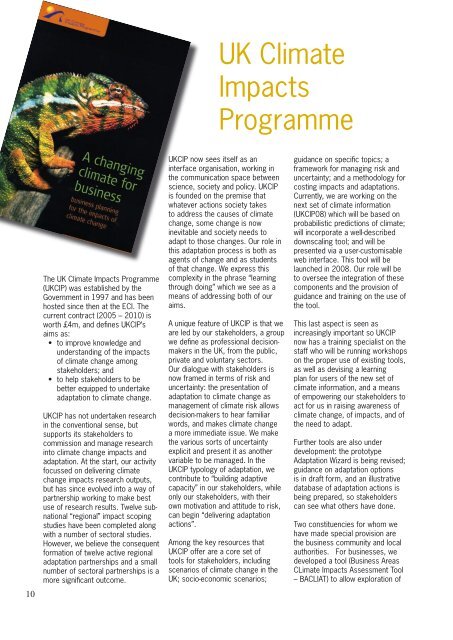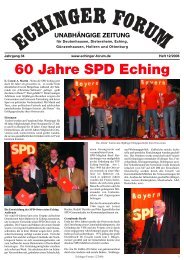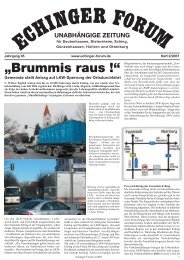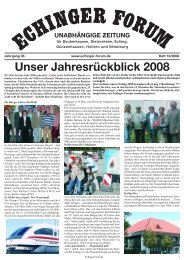Büro Karl Holmer Sachverständiger für Kraftfahrzeuge - Echinger Forum
Büro Karl Holmer Sachverständiger für Kraftfahrzeuge - Echinger Forum
Büro Karl Holmer Sachverständiger für Kraftfahrzeuge - Echinger Forum
You also want an ePaper? Increase the reach of your titles
YUMPU automatically turns print PDFs into web optimized ePapers that Google loves.
10<br />
The UK Climate Impacts Programme<br />
(UKCIP) was established by the<br />
Government in 1997 and has been<br />
hosted since then at the ECI. The<br />
current contract (2005 – 2010) is<br />
worth £4m, and defines UKCIP’s<br />
aims as:<br />
• to improve knowledge and<br />
understanding of the impacts<br />
of climate change among<br />
stakeholders; and<br />
• to help stakeholders to be<br />
better equipped to undertake<br />
adaptation to climate change.<br />
UKCIP has not undertaken research<br />
in the conventional sense, but<br />
supports its stakeholders to<br />
commission and manage research<br />
into climate change impacts and<br />
adaptation. At the start, our activity<br />
focussed on delivering climate<br />
change impacts research outputs,<br />
but has since evolved into a way of<br />
partnership working to make best<br />
use of research results. Twelve subnational<br />
“regional” impact scoping<br />
studies have been completed along<br />
with a number of sectoral studies.<br />
However, we believe the consequent<br />
formation of twelve active regional<br />
adaptation partnerships and a small<br />
number of sectoral partnerships is a<br />
more significant outcome.<br />
UK Climate<br />
Impacts<br />
Programme<br />
UKCIP now sees itself as an<br />
interface organisation, working in<br />
the communication space between<br />
science, society and policy. UKCIP<br />
is founded on the premise that<br />
whatever actions society takes<br />
to address the causes of climate<br />
change, some change is now<br />
inevitable and society needs to<br />
adapt to those changes. Our role in<br />
this adaptation process is both as<br />
agents of change and as students<br />
of that change. We express this<br />
complexity in the phrase “learning<br />
through doing” which we see as a<br />
means of addressing both of our<br />
aims.<br />
A unique feature of UKCIP is that we<br />
are led by our stakeholders, a group<br />
we define as professional decisionmakers<br />
in the UK, from the public,<br />
private and voluntary sectors.<br />
Our dialogue with stakeholders is<br />
now framed in terms of risk and<br />
uncertainty: the presentation of<br />
adaptation to climate change as<br />
management of climate risk allows<br />
decision-makers to hear familiar<br />
words, and makes climate change<br />
a more immediate issue. We make<br />
the various sorts of uncertainty<br />
explicit and present it as another<br />
variable to be managed. In the<br />
UKCIP typology of adaptation, we<br />
contribute to “building adaptive<br />
capacity” in our stakeholders, while<br />
only our stakeholders, with their<br />
own motivation and attitude to risk,<br />
can begin “delivering adaptation<br />
actions”.<br />
Among the key resources that<br />
UKCIP offer are a core set of<br />
tools for stakeholders, including<br />
scenarios of climate change in the<br />
UK; socio-economic scenarios;<br />
guidance on specific topics; a<br />
framework for managing risk and<br />
uncertainty; and a methodology for<br />
costing impacts and adaptations.<br />
Currently, we are working on the<br />
next set of climate information<br />
(UKCIP08) which will be based on<br />
probabilistic predictions of climate;<br />
will incorporate a well-described<br />
downscaling tool; and will be<br />
presented via a user-customisable<br />
web interface. This tool will be<br />
launched in 2008. Our role will be<br />
to oversee the integration of these<br />
components and the provision of<br />
guidance and training on the use of<br />
the tool.<br />
This last aspect is seen as<br />
increasingly important so UKCIP<br />
now has a training specialist on the<br />
staff who will be running workshops<br />
on the proper use of existing tools,<br />
as well as devising a learning<br />
plan for users of the new set of<br />
climate information, and a means<br />
of empowering our stakeholders to<br />
act for us in raising awareness of<br />
climate change, of impacts, and of<br />
the need to adapt.<br />
Further tools are also under<br />
development: the prototype<br />
Adaptation Wizard is being revised;<br />
guidance on adaptation options<br />
is in draft form, and an illustrative<br />
database of adaptation actions is<br />
being prepared, so stakeholders<br />
can see what others have done.<br />
Two constituencies for whom we<br />
have made special provision are<br />
the business community and local<br />
authorities. For businesses, we<br />
developed a tool (Business Areas<br />
CLimate Impacts Assessment Tool<br />
– BACLIAT) to allow exploration of

















